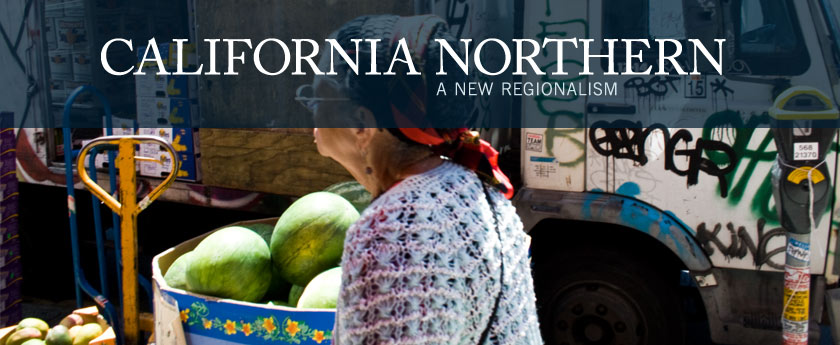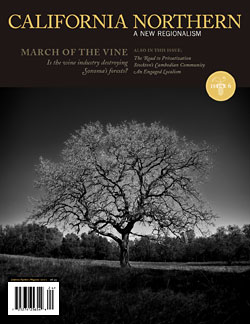A Conversation with Mark Arax
It is a rare writer so deeply steeped in the land he documents that it becomes nearly impossible to tell where the individual ends and his surroundings begin. Mark Arax, a lifelong chronicler of the complications and contradictions of California, is such a writer.
Arax worked the Central Valley beat for fourteen years as a journalist for the Los Angeles Times. He documented rampant development, forgotten towns, and the lives of immigrant farm workers, earning several awards for his work. Since leaving the Times, he’s published two books that are essential to understanding the identity, both past and present, of the state.
King of California tells the story of cotton magnate J.G. Boswell, who built a vast agricultural empire out of hundreds of thousands of dusty acres in the Tulare Lake basin. The book ties together Boswell’s battles with organized labor, politicians, government agencies, and fellow capitalists to paint a harrowing picture of the history of our state’s farming industry, a history very much at odds with the traditional image of bucolic small enterprises run by hard-working, salt-of-the earth farmers.
Arax’s latest effort, West of the West, is a collection of journalistic essays depicting the people and places in California that often go ignored. Arax
explores the complex worlds functioning just outside the scope of our daily experience, telling the stories of a motley cast of characters—supposed terrorists in Lodi, Oaxacan immigrants near Fresno, pot growers on the North Coast. Taken as a whole, these Californians reveal themselves to be confused, anxious, and paranoid, yet surprisingly grounded in history and place. The result is a fragmented vision of a region with a dizzying array of identities, often of people who once shared a faith that California would be able to fulfill their needs and desires, but whose faith is now eroding.
We spoke with Arax about West of the West, his approach to writing, his past, and the identity of Northern California.
CN: Let’s start with West of the West. What was your goal in writing this book, and why did you think it needed to be written?
I’ve been playing with different ways of telling nonfiction. I started off as a traditional journalist, doing investigative and feature projects. In those stories, the writer was never present—that is, the voice of the writer was present, but the writer himself was not, at least not from the standpoint of the “I.” As my career at the L.A. Times evolved, I started doing
pieces in their magazine where I would bring in some of that memoir voice and perspective. There’s the New Journalism, right? Well, maybe West of the West was just an attempt to return to that style of journalism. Or, maybe it was an attempt at a new New Journalism. I don’t know.
Either way, I was struck by this idea of having a more honest engagement with the reader. This whole idea of objectivity to me is kind of a pretend notion. We’ve labored under that as journalists for a long, long time, that you have to be objective. And I think that’s just bullshit. What we should be striving for is fairness. When you get out to do a story, you’re open to all the possibilities of where it might go. But the idea that a journalist can be objective is a false premise. From the stories we pick to the questions we choose to ask to the notes we decide to take—all those decisions along the way, all those are subjective decisions that are filtered by who we are as people, by our histories.
What I wanted to do in West of the West was tell these dramas that were playing out in the land in a way that declared myself to the reader. My own biases, issues, and history are in each of these pieces—some are memoir, some are told in third person. You get a sense of who the writer is, and you also see that the writer’s viewpoint on an issue may be changing the deeper he’s getting into the story. It’s a type of writing where you let the reader see how this accumulation of details and facts ends up changing your viewpoint on things. I know that sounds highfalutin, but I wanted to use memoir, use reportage, use the techniques of essay, use the soapbox, whatever it took to get at the truth—and I say that guardedly—but to get at the truth of an issue.
The other thing I wanted to do involved the fact that my career at the L.A. Times and my marriage had both ended after twenty-plus years, and I just felt the need to get out on the road and visit these parts of California. There’s this notion that California is two states, but really, if you wanted to divide it up, it’s probably five states. So I kind of went out into each of those five states and tried to find a drama that was playing out on the land, with the idea that each part of the state, by virtue of its own geography, history, and psychology, produces its own dramas. Those dramas are unique to the place.
So I’m in the San Joaquin Valley, and I follow a Triqui Indian family for a whole year through these harvests, from one raisin harvest to the next, and just document their lives. I take a look at illegal immigration through the prism of that experience. Then I’m up in Humboldt, and what’s the drama that plays out in Humboldt? Well, the obvious drama there, it’s marijuana—the growing of marijuana, the cultivation of marijuana. But I wanted to do it in kind of a different way.
This is an excerpt of our conversation with Mark Arax.

